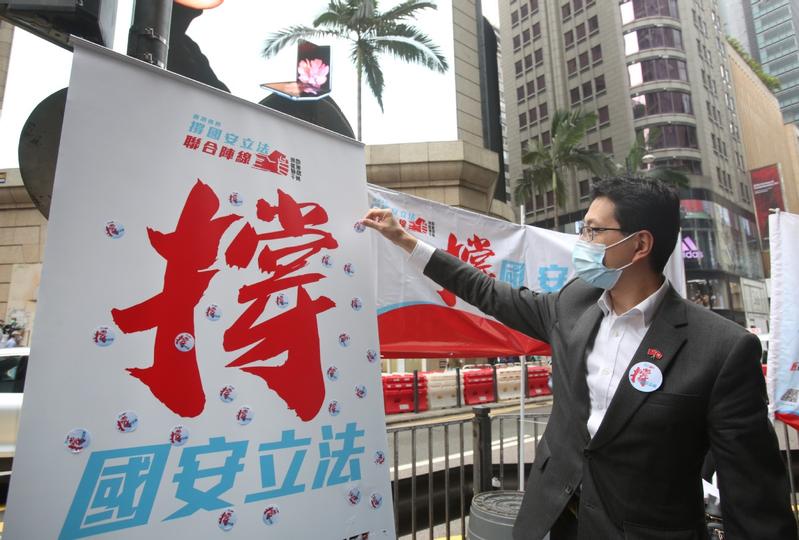 Stanley Ng Chau-pei, a Hong Kong deputy to the National People's Congress shows his support of the national security legislation after signed a petition at a street stand in Hong Kong Special Administrative Region, May 29, 2020. (PARKER ZHENG / CHINA DAILY)
Stanley Ng Chau-pei, a Hong Kong deputy to the National People's Congress shows his support of the national security legislation after signed a petition at a street stand in Hong Kong Special Administrative Region, May 29, 2020. (PARKER ZHENG / CHINA DAILY)
Unwarranted allegations and threats of sanctions by the United States and other Western countries over Hong Kong's proposed national security legislation are "violations of international law and international practice", said the special administrative region government, along with legal and political heavyweights in the city.
In a statement on Friday, an SAR government spokesman said Hong Kong's separate customs territory status is enshrined in the Basic Law and free trade policy will be continued
Their strongly worded remarks came after Western countries had repeatedly attempted to derail a proposed law for Hong Kong by China's top legislature to close a legal loophole in national security in the SAR. They threatened sanctions on the city, claiming that the law, if passed, would erode Hong Kong's high degree of autonomy guaranteed under the "one country, two systems" principle.
In a statement on Friday, an SAR government spokesman said Hong Kong's separate customs territory status is enshrined in the Basic Law and free trade policy will be continued.
The US has threatened to revoke the city's preferential trading status.
"The threat of sanctions to achieve the purpose of interfering with the policies of another place is a violation of international law and international practice. In the Hong Kong-US relationship, any sanctions are a double-edged sword that will not only harm the interests of Hong Kong but also significantly harm those of the US," said the spokesman.
In the past decade, the US trade surplus with Hong Kong has been the biggest among all its trading partners, with the merchandise trade surplus totaling US$297 billion from 2009 to 2018. In 2019, that surplus declined from US$31.4 billion in the previous year to US$26.4 billion as a result of Sino-US trade tensions, according to the HKSAR government.
Should any sanctions be contemplated in other areas like services and investment, the interests of the 1,300 US corporations in Hong Kong might further be affected, the spokesman said.
The spokesman regretted the unfounded allegations about the erosion of the SAR's high degree of autonomy and the legitimate rights and freedoms Hong Kong people are entitled to.
The National People's Congress has adopted a decision to draft a national security law for Hong Kong that outlaws acts of secession, subversion, terrorism and conspiracy with external forces in Hong Kong.
ALSO READ: 2,600 celebrities back national security legislation for HK
Former HKSAR chief executive Leung Chun-ying said the US, along with the United Kingdom, Canada and Australia, are interfering in China's internal affairs, and they need to face the fact that Hong Kong is not a colony. They will suffer more if they lose Hong Kong and the Chinese mainland, the world's largest market, with which they enjoy close trade ties, Leung said.
Leung, now vice-chairman of the National Committee of China's top advisory body, was referring to a joint statement by the four countries that accuses China of violating promises made in the Sino-British Joint Declaration.
Chinese Foreign Ministry spokesman Zhao Lijian said on Friday that with the return of HKSAR to the nation in 1997, all of the UK's rights and duties conferred by the declaration have been fulfilled and there is no legal ground for the four countries to use the declaration to lay charges against China.
Barrister Kacee Ting Wong, a member of the Chinese Association of Hong Kong and Macao Studies, said the core legislative intent of the NPC is to prevent its own territory from sabotage by separatist activities, which sometimes collude with foreign forces.
"This is a robust, unquestionable answer given by the highest legislative organ in China to prolonged violent anti-government protests in Hong Kong," Ting said.
The barrister said the recent request by the US at the United Nations to discuss the proposed national security law for Hong Kong before the Security Council is "in direct contravention of a universally accepted international law principle of non-interventionism".
China's UN Ambassador Zhang Jun said China "categorically rejects the baseless request" because the national security legislation for Hong Kong is an internal matter and "has nothing to do with the mandate of the Security Council".
In a statement, Zhang stressed the proposed legislation is totally "legitimate, legal and imperative", in view of the often violent protests in Hong Kong over past year.
"Having enacted dozens of national security laws itself, the US tries to interfere in China's national security legislation. Such a double standard has fully exposed the vicious intention of the US," the statement said.
In Canada, Chinese-Canadian communities also voiced support for the national security law, saying it will solidify Hong Kong's status as an international financial center.
READ MORE: National security law for HK 'constitutional and reasonable'
Ping Tan, a lawyer and president of the Chinese Canadians for China's Reunification, said the intervention and manipulation by foreign forces in Hong Kong is "unacceptable".
"Burning the flag, attacking government departments, overt violence against the police, damaging public property - no country can allow such behavior to endanger national security. It is absurd to say that the central government has no right to legislate," Tan said.


